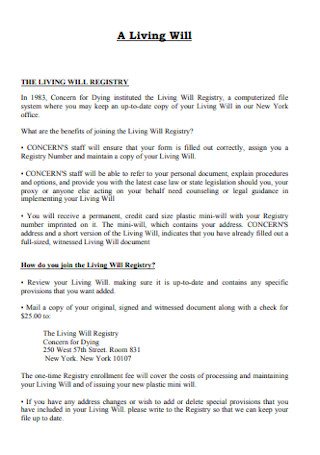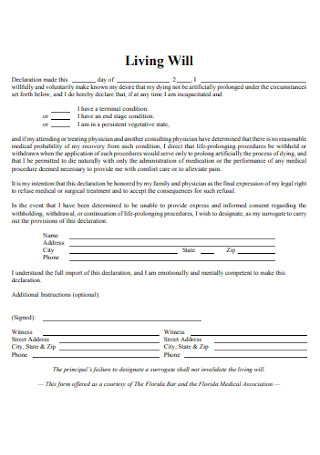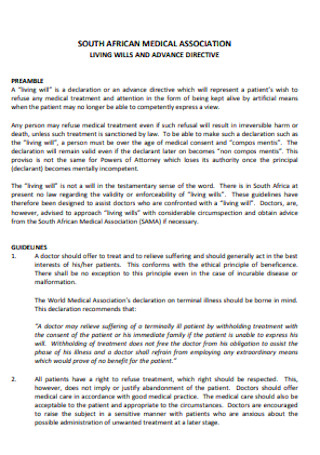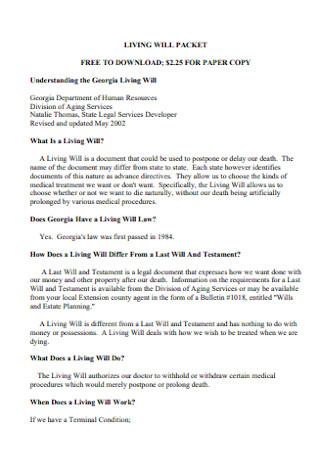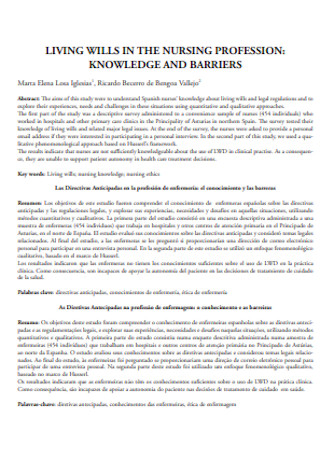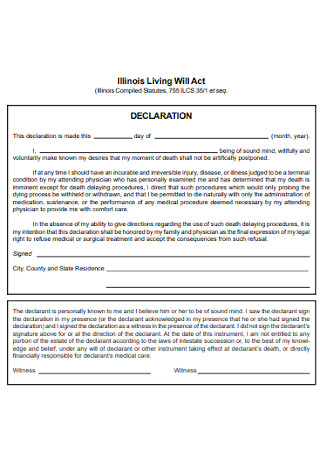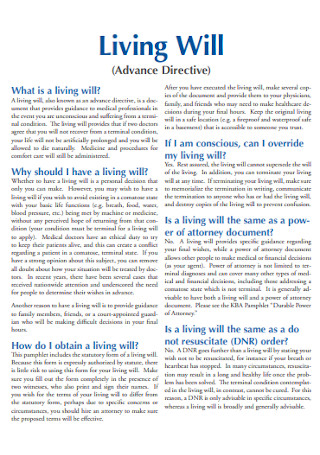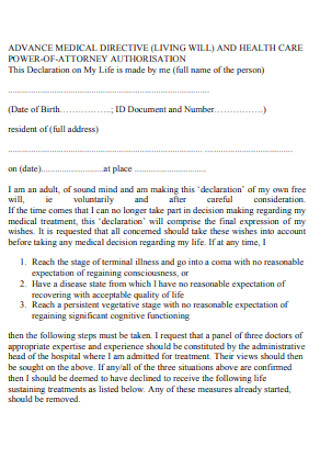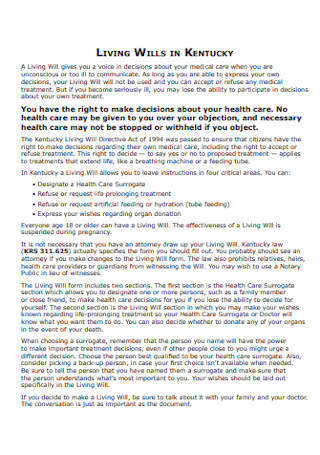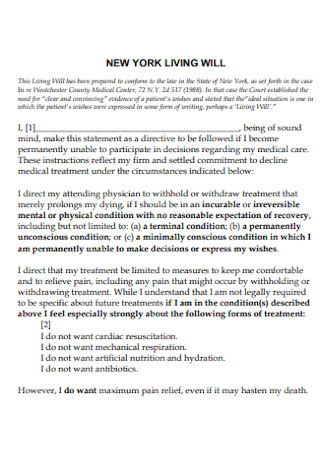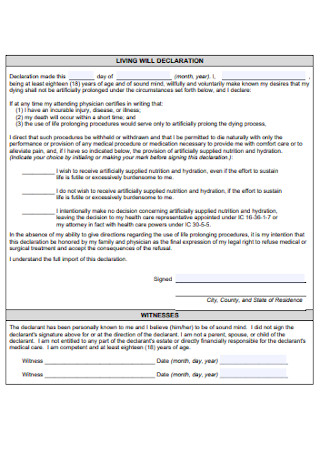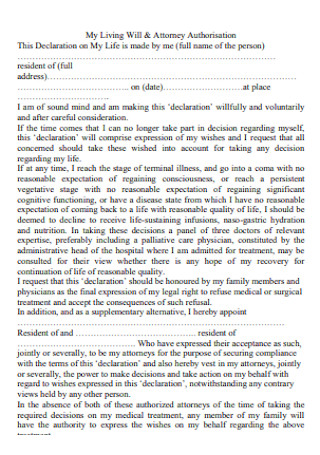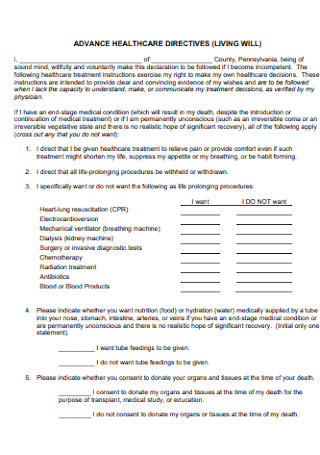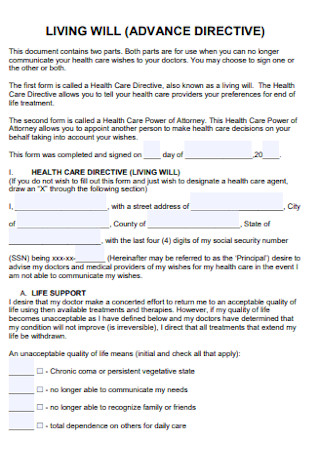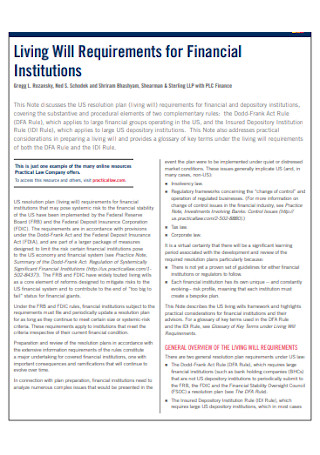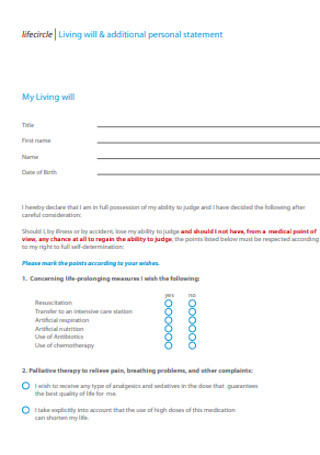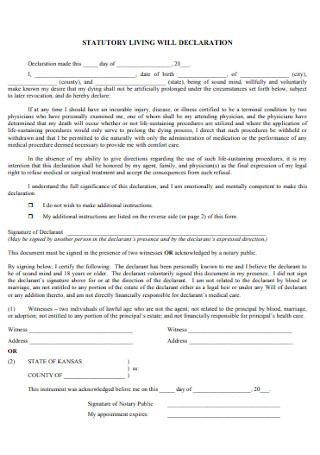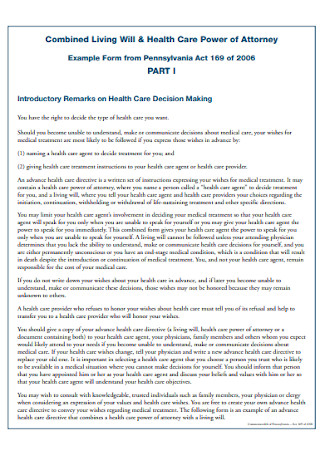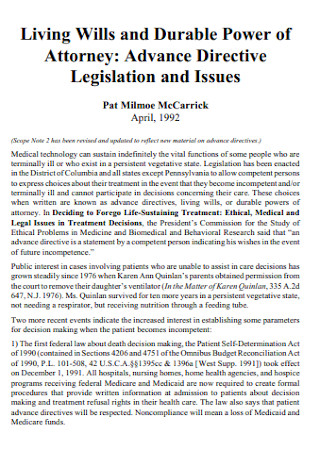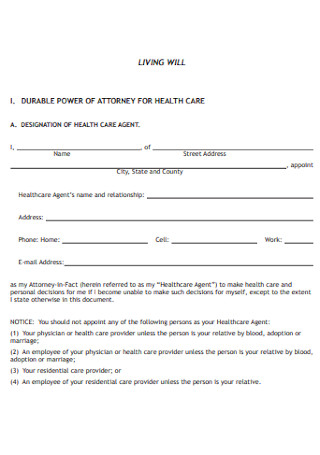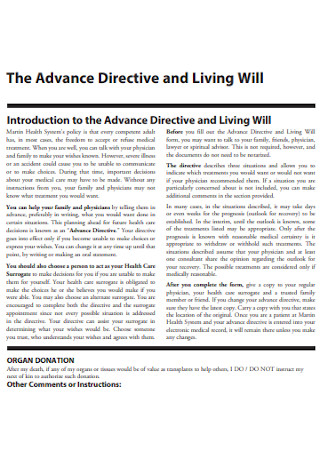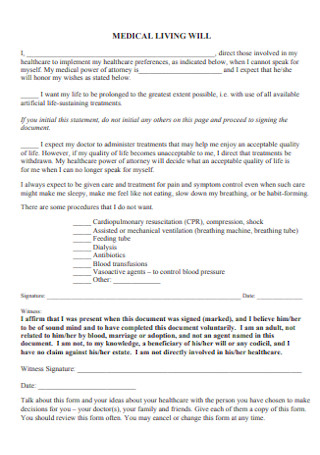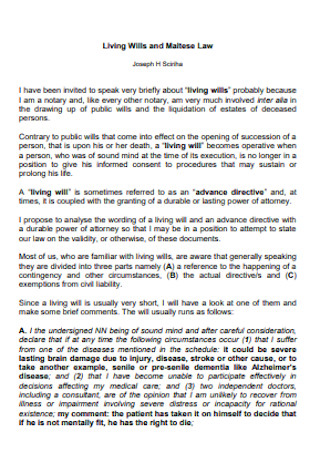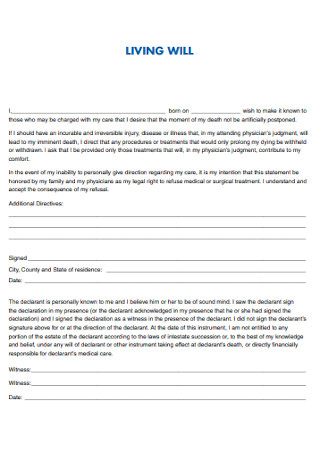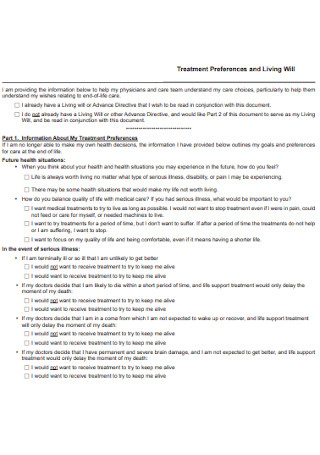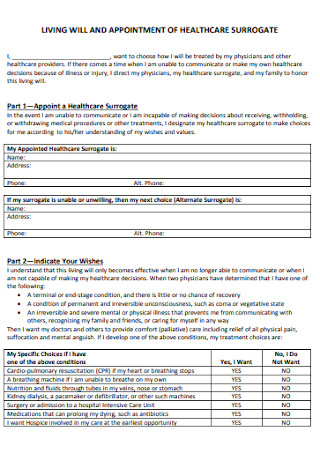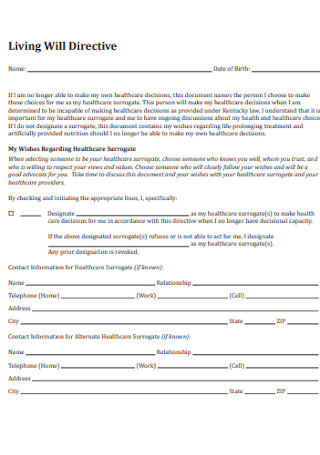FREE Living Will s to Download
What Is a Living Will?
A living will is a written document detailing instructions regarding one’s health, in the event that an end-of-life decision needs to be made or if the person is faced with a serious life threatening situation. The document is prepared by an individual, either with or without the help of a lawyer, in case he or she is rendered incapacitated and no longer has the ability to make informed decisions.
According to a 2019 article published by the non-profit organization AARP, less than 40% of American adults have created a living will. Moreover, 25% admitted to having never thought of end-of-life planning at all.
Importance of a Living Will
Preparation: In life, there’s always the possibility of sudden death. Too many people wish they had more time to prepare themselves and leave instructions with loved ones, in case they pass away sooner than expected. Drawing up a living will can not only prepare you for worst case scenarios, but it protects your kin and dependents from unwanted stress and confusion. Clarity: A living will allows you to express your wishes clearly, while still able. It also ensures your freedom and choice is taken into account. If it ever reaches a point where end-of-life decisions must be made, a living will provides some measure of reassurance. Peace of Mind: You will sleep better knowing that if your life is in the hands of medical professionals, your choice is accounted for because you left instructions in advance. There are people who just don’t see the point in prolonging the inevitable. Some prefer to die a peaceful death, without being hooked to tubes and machines. Others only want to live out their final days in peace, surrounded by family.
Parts of a Living Will
A living will is a legal document that must contain key areas detailing the person’s information and choices. These parts include the following:
Declarant’s Details: Whatever your reason is for creating a living will, make sure your complete name, address, and date are contained in the document. Just like any form, these are required basic information. Some states readily provide forms where all the declarant needs to do is provide the necessary details. Medical Decisions: If a living will could be compared to an essay, this part would be the main body of the essay. You should state the terms and conditions that you specifically want. The medical directives you provide will make healthcare practitioners aware of your choices, guiding their decisions as to what treatment and care they perform on you. Some states have official standardized forms that enumerate the specific directives, so the person would only need to tick the boxes. These important medical decisions are often enumerated and categorized into separate parts. End-of-life decisions are usually needed when the person is incapacitated, or is unable to respond and make sound decisions for himself or herself. When a person meets any of these criteria, the responsibility to make decisions usually falls on the family, in the absence of a living will. For instance, a cancer patient has relapsed and the cancer has progressed, leaving him paralyzed and completely unresponsive. Despite continual and numerous efforts of doctors and nurses to treat the cancer, there is little hope for recovery. A difficult decision must obviously be made to either keep fighting or let the disease run its course. However, with a living will ready, the decision has already been made prior. It contains clear instructions on what medical treatment and life sustaining means the person would want or not want performed on him or her. Official Designated Person: Include the complete name and information of the person designated to execute the living will and inform the healthcare professionals involved. The emergency contact is usually the closest kin, a trusted friend or any close loved one. Sometimes this person can also be referred to as the healthcare agent. Ensure you state the relationship between the declarant and the agent (e.g., daughter, nephew, etc.). In many cases, consent and the power to make important medical decisions can also be awarded to the agent, if need be. The declarant bestows confidence in the agent, trusting that he or she will act in the person’s best interest. Second Choice Person: In the event that the official designated agent is unwilling or unable to execute the wishes of the person, a second person may be listed down as a backup choice. As with the first choice, provide the complete name, address, and contact information, as well as the relationship to the declarant. Other Final Wishes: This part is optional but some people take it upon themselves to give final instructions that are not necessarily related to medical care. This is to ensure that their family and close associates honor their dying wishes. Examples of these include, but are not limited to, funeral arrangements and religious rites. Perhaps the person prefers to be cremated and not buried; or the dying person may leave directions to his son that his wake should only be a maximum of 7 days and no more. The terminally ill patient could also include in his living will the desire to be anointed and prayed over by a priest in his final moments. If this be the case, provide the name, address and contact number of the priest, pastor, or religious minister. Essentially, this section can include any special instructions or other religious and spiritual requests. Oath and Signature: Since it is your personal choice to craft a living will, make sure it is duly signed. A brief declaration can be inserted at the end of your living will. It should state that you were of sound mind and body as you were writing your living will; and that you fully understand the purpose of the document. Don’t forget to include the date, as well. Witness Line and Notary: Depending on state requirements and governing laws, a living will usually requires a witness or witnesses in order to complete the authentication of your will. In addition to a witness, some states need a qualified notary public to further certify the document.
Examples of Medical Directives in a Living Will
In a living will it is important to let your physician, and other healthcare professionals attending to you, know what your preferences and wishes are. If you wrote the living will while still able, you need to assign a family member or a loved one to coordinate with the doctors and hospital– if you yourself are incapacitated and unable to do so. The following are a few examples of directives that may artificially prolong a life:
Life Support: In a difficult time such as the pandemic, COVID-19 cases can range from asymptomatic, mild, severe to critical. In very severe cases, often the only thing keeping the person alive is a machine, allowing the patient to artificially breathe. Other cases wherein a person has been in a vegetative state for months or even years, life support is the only thing keeping them alive. Other people explicitly declare in their living will the desire not to be resuscitated, when the conditions are no longer viable. Do not resuscitate or DNR is a clear and self-evident instruction for healthcare professionals. It’s important to establish in the will specific terms and conditions for all the how’s and ifs (i.e., how long should the person be kept on life support). For instance, a woman may instruct in her living will that all means should be exhausted to preserve her life. But if there is no improvement or if she is unresponsive for six months, then all life support should be withdrawn. Sustained Treatment: You are able to decide in your living will what life sustaining treatment you prefer or reject in order to prolong life. This may include the use of ventilators and respirators. Whether or not you want doctors to perform emergency surgery, or other operations to extend your life, can also be identified in your living will. Many incapacitated patients are given nutrition (e.g., food and fluids) via feeding tubes. You can choose whether to be intubated or not. Blood Transplants: In the event that you would require blood transfusions, you may opt to receive one or not. If you choose to, you can list down potential donors or specify your blood type. Other Medications: The declarant may opt out of an operation or the use of ventilators; but could still wish to receive certain medications. The patient may be given antibiotics that may increase the likelihood of survival; however not guarantee it. Organ Donation: When the body expires, some people voluntarily donate their organs for science. Medical students, hospitals, universities, or research laboratories have great use for this. You can indicate in your will if you are willing or unwilling to contribute your organs for medical study and research. Pain Management: It is a sad reality, but not all people successfully respond to treatment; and sometimes even take a turn for the worse because of it. There is only so much medicine, technology and science can do. Sometimes all that is left is the question of easing the pain and ensuring a patient’s final days are comfortable enough. As a declarant, you can instruct your principal healthcare providers of your preferences when it comes to pain relief. For instance, you prefer to convalesce at home and spend your remaining time with your family. Perhaps you have come to terms with the inevitable and would want to be placed under hospice care, then wait to die naturally.
How to Write a Living Will
With the information provided above, you can now start outlining your living will and filling in the necessary details. Follow this step-by-step guide to begin:
Step 1: Research on Life Sustaining Means
Knowledge is power. Information is relatively easier to access these days. If you decide on creating a living will, the first step is to arm yourself with medical information. Research on the different life preserving methods so you are able weigh your options and make educated decisions.
Step 2: State Basic Personal Information
Make sure your living will contains your complete information. It is, after all, a legal and official document.
Step 3: Identify and Enumerate Your Preferences
With the information you have gathered about life sustaining treatment and support, it is up to you to decide on whether you want these done or not. Keep in mind the tips above and make sure you take the time to evaluate each choice properly. You can consult family members and loved ones so they also can share their views and opinions on the matter.
Step 4: Have the Document Recognized
Not all states require a notarized living will. But in order for your document to be officially recognized by the authorities, it must be duly signed by you and by witnesses. This is a necessary measure to certify the authenticity of your document.
FAQs
Is a living will the same as a will?
Not necessarily. A living will often involves medical instructions or healthcare directives; whereas, a last will and testament usually pertains to property or financial instructions intended for the loved ones that are left behind.
Do you need a lawyer to make a living will?
You are free to engage the services of an attorney, but it is not always required. Having a basic healthcare agent would usually suffice. The agent is typically a close family member or a reliable friend; it cannot be your personal doctor or other medical professional.
What is a living will and how important is it today?
A living will is optional. It is an individual’s choice to prepare health-related directives in case the worst happens. Amidst the on-going pandemic, a living will can be regarded as all the more important and beneficial. It not only gives the opportunity for the individual to prepare a plan for himself, but also to prepare his family and close confidants.
The essence of a living will is really choice. A person should opt to preserve his right and agency if he is in the position to do so. End-of-life decisions are not easy. It is not easy for the patient, the medical practitioners, and especially for the family. When people are rendered incapacitated, are no longer able to make decisions, or are unable to function normally, it can be worrisome and difficult for loved ones who have to witness the painful struggle. But with a living will prepared, the burden can be lifted slightly. Choose from the many sample templates above and start planning now!
